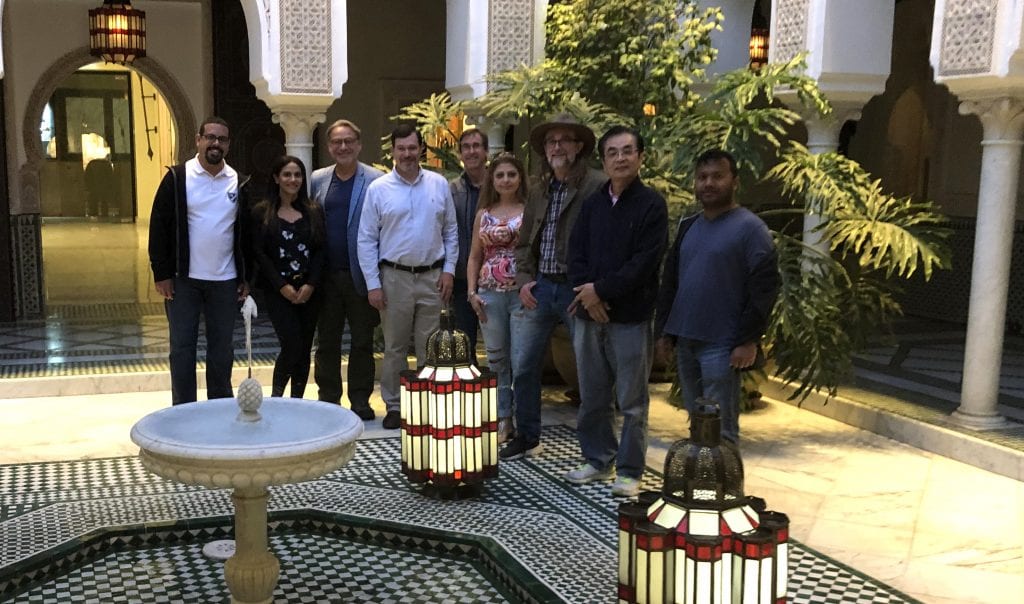New Project Aims To Address Global Crises

UCF delegation at GPII-Hollings Center Smart & Sustainable Cities Dialog Conference, Marrakech, Morocco, October 2019. UCF participants include GPII Director David Dumke and Puerto Rico Research Hub’s Fernando Rivera. The delegation engaged with global partners in discussions about sustainability, including managing crisis.
The UCF Office of Global Perspectives & International Initiatives (GPII) is pleased to announce the launch of a new project, “Addressing Global Crisis” (AGC). The AGC Project will examine not only how the world responds to the current coronavirus pandemic, but how governments, individually and collectively, deal with natural disasters, ecological challenges and climate change. The Project, which features ongoing expert discussions about various aspects of crisis management and decision-making, will produce a series of articles, a book and online content, and eventually organize topical events and international conferences.
With programs, centers and initiatives working with partners across the globe, GPII is uniquely positioned to build a network of regional and topical experts, many with first-hand experience, who can assess the many aspects of global crisis. GPII intends to utilize its existing networks of global scholars and experts, including those in strategic areas, particularly the Middle East-North Africa region, South Asia and the Caribbean.
GPII is closely linked with the UCF Puerto Rico Research Hub, founded in the wake of Hurricane Maria, which devastated the island. The Puerto Rican experience, in particular, illustrates the need to properly plan for and respond to disaster, and the dangers of not doing so. The Hub’s Director, Dr. Fernando Rivera, is connected to a wide, multi-disciplinary network of experts who have examined all aspects of the Puerto Rican situation. This expertise can be applied across the globe, including to the U.S. mainland. GPII will also work with partners in Egypt, Morocco, the Isle of Man, and with think tanks active in all corners of the globe. The internal UCF AGC working group will include faculty members from multiple colleges and a variety of academic disciplines.
“The current situation has forced many of us to think and reflect, and hopefully to turn some of those thoughts to productive use. The Addressing Global Crisis Project connects us with our partners in the common cause of understanding to problems of today and how we should look at the challenges of tomorrow, particularly those posed by climate change,” stated GPII Director David Dumke, who also noted that the concept of sustainability would be laced throughout the Project’s activities.
The Project will be organized around five primary pillars:
- Delivery of services and infrastructure
- Water-energy-food security
- Governance and politics
- Economic development
- National security
Communications, public health and ecology are involved in all areas, and region-specific and historical expertise will also be incorporated into the Project’s work. While today’s challenge is specifically management of COVID-19, AGC will look at historic and contemporary examples of crisis management and response, including the repercussions on the public and political systems of mismanagement. These lessons can be applied to addressing global climate change, which has long been discussed but addressed in a piecemeal manner.
“Although this pandemic continues to claim lives daily, it is vital to learn and prepare for the future, and discern the changing nature of public health, governance, national security, diplomacy and economics. The AGC Project should offer some interesting solutions, and at minimum, provide beneficial food for thought for decision-makers,” added Dumke.
The first AGC article, written by Dr. Jonathan Powell of the UCF School of Politics, Security, and International Affairs and Centre College Visiting Lecturer Dr. Christopher Faulkner, was released this week. The article is available on the GPII website here.
